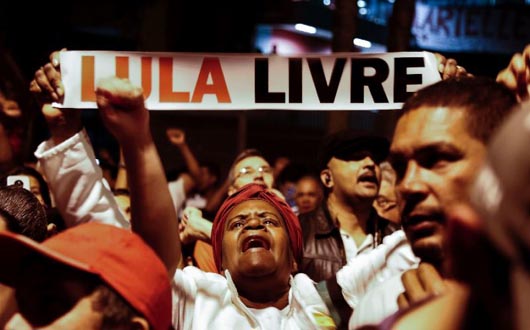SAO PAULO, Aug 10, 2018 (BSS/AFP) – Eight of Brazil’s presidential
candidates — missing imprisoned frontrunner Luiz Inacio Lula da Silva —
clashed in the first debate of the campaign Thursday, showcasing sharp
divides in Latin America’s biggest nation.
The debate in Sao Paulo, broadcast on TV Bandeirantes, did not feature the
four most minor candidates of the 13 who have launched campaigns ahead of the
October 7 first round of voting. And Lula’s enforced absence due to his
corruption conviction cast a shadow, given his stunning lead in the polls.
But four major players were on stage: right-winger Jair Bolsonaro, who is
polling in second place after Lula, and his next biggest rivals, center-right
former Sao Paulo governor Geraldo Alckmin and environmentalist Marina Silva,
followed by leftist Ciro Gomes.
The combative tone among the seven men and one woman quickly illustrated
the battle lines after two years of severe recession, a tidal wave of violent
crime, and one of the world’s biggest corruption scandals.
With deeply unpopular President Michel Temer not seeking a new term, it is
the least predictable election in decades.
Alckmin, who wants to be seen as the calm, authoritative, pro-business
candidate, stressed the need for market reforms so that the economy can “grow
and grow strongly.”
But Silva scored a point likely to have gone down well with voters angry at
the ruling establishment, including Alckmin’s center-right PSDB party, when
she said:
“Those who created the problems won’t solve the problems.”
Bolsonaro is the candidate getting the most attention other than Lula, who
is serving a 12-year sentence for corruption.
However, the former army officer appeared less confident in the live
televised debate than he does when he meets his fervent crowds of supporters
and spreads his message to a huge social media following.
Asked about the rapidly rising rate of rape and violence against women in
Brazil, Bolsonaro repeated his controversial call for “voluntary chemical
castration” of criminals.
“I think we would prevent this problem of violence against women,” he said.
Guilherme Boulos, of the leftwing Socialism and Liberty Party, used his
national TV airtime to tell Bolsonaro: “Brazil knows you are racist, macho
and homophobic,” before going on to accuse him of corruption.
– Lula’s shadow –
The elephant in the room was Lula.
A court earlier Thursday turned down lawyers’ request for Lula to be
allowed to participate by video link in the event, arguing it was “essential”
to the campaign.
His leftist Workers’ Party also failed to get TV Bandeirantes to mark his
absence with an empty chair or to allow his vice presidential pick, former
Sao Paulo mayor Fernando Haddad, to take his place.
Instead, party leaders organized what they called an alternative debate in
Sao Paulo, which was broadcast on social media, featuring Haddad and other
allies.
However surreal it might seem for a jailed ex-president to seek a third
term, Lula, who ruled from 2003-2010, means business.
His legal team hopes to persuade the Supreme Electoral Tribunal to allow
him to participate, despite the country’s clean slate law that would ban
anyone having lost an appeal to a criminal conviction — as is Lula’s case.
As one of the world’s most prominent politicians during his presidency and
still a household name in Brazil, Lula boasts the kind of following most
other politicians would crave.
That translates into remarkable support, partly based on memories of Lula’s
trailblazing policies to promote racial and social equality and his
stewardship of a commodities-fueled economic boom.
Opinion polls give him around 30 percent in a crowded first round, then
winning easily in a second-round runoff.
– Unpredictable –
Lula’s fate is only one part of the uncertain electoral picture.
The October polls will also see elections of 27 governors, all 513
congressional lower house deputies and two thirds of the 81 senators.
And so far voters appear hardly enticed by the prospect.
A poll published this month by the National Confederation of Industries
showed 45 percent of Brazilians “pessimistic or very pessimistic” about the
elections. While voting is obligatory, a third plan to cast spoiled ballots,
the poll found.
Other polls point to between 33 and 41 percent of the electorate defying
the law to skip voting.
“Brazil’s political system continues to generate a lot of frustration,”
political analyst Matias Spektor told AFP.



